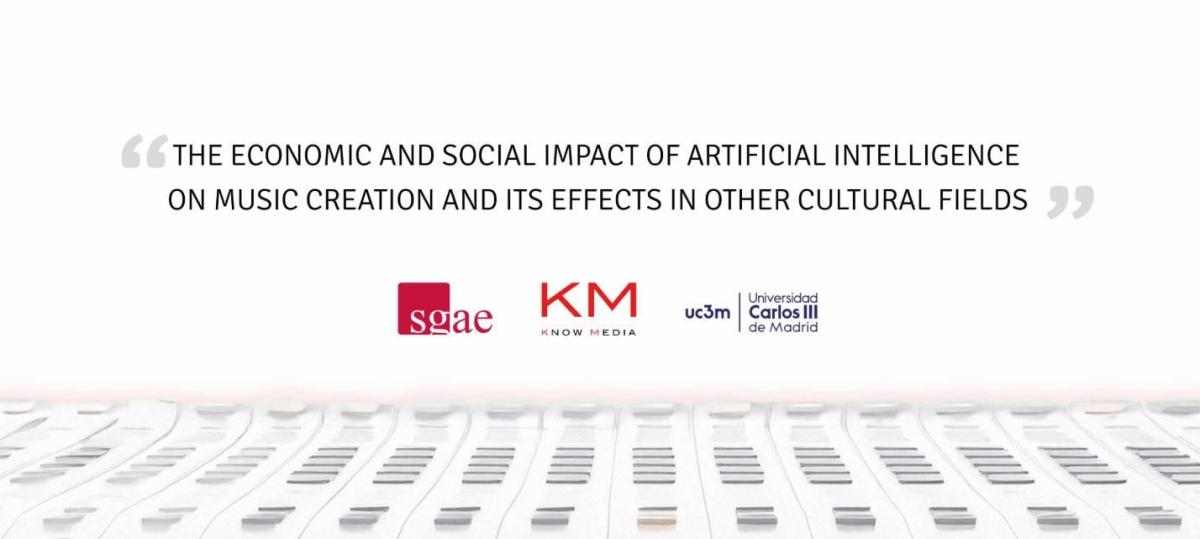AI could reduce music authors’ rights revenues in Spain by up to 28%
of more than €100 million in 2028
The music sector call for regulations to ensure human creativity
has “an inviolable space” from AI automation

The Spanish Society of Authors and Publishers (SGAE) has published commissioned a comprehensive independent study to examine its economic and social impact of AI on Spain’s music sector.
The study, conducted by consulting firm Know Media in collaboration with University Carlos III, is the first such assessment of the impact of AI on the creative sector in Spain. It analyses the attitudes, uses, and future expectations of music authors in relation to AI, as well as the prospect of human creative activity being replaced by automated processes.
The report, The Economic and Social Impact of Artificial Intelligence on Musical Creation and Its Effects on Other Cultural Fields, uses quantitative and qualitative metrics to estimate the likely economic cost of AI in the absence of regulation to protect creators. The study also surveys a diverse sample of 1,257 music creators in Spain, covering a wide range of styles and income levels.
Key Findings of the Study Economic impact
- By 2028, around 28% of copyright revenues in Spain will be at risk due to GenAI
- This represents over €100 million at risk in 2028, and between €160–180 million at risk for 2025–2028, based on SGAE’s revenue forecasts and direct earnings
- Spain is at the higher end of international estimates, reflecting AI’s rapid integration into business models that rely heavily on music
Key takeaway of the study:
“The convergence of the multiple quantitative and qualitative studies available confirms that GenAI poses a structural threat to creators’ income. ….. The sector’s demands focus on rapid policy responses, legislative reforms, and fair compensation mechanisms to ensure that technological innovation does not erode authors’ rights or sustainability.”
Survey shows creators’ anxiety over use of AI
The survey shows that creators in Spain are rapidly moving to adapt to AI but worry about their future livelihoods as AI tools substitute human creations.
- AI usage among creators. 34% of respondents have already used AI tools at some point, and an additional 17% plan to do so soon.
- Expectations of losses. Overall, authors have a mixed feeling of uncertainty and concern about expected drop in royalties and the potential irresponsible or abusive use of AI.
- Attitudes toward AI. Much of creators’ uncertainty stems from their fear of being left out of the market if they do not adopt AI tools, since AI is seen as a way to reduce costs (36% of respondents confirm this). There is also concern about the increasing substitution of human activity by machines (26%).
Creators’ use of AI
Areas of application. AI is mainly used in three key areas: composition, production, and music promotion. Most popular tools include text and lyric generators such as ChatGPT or iZotope Ozone; music composition software like Suno or Bandlab; creative image editors such as DALL·E or Spotify AI (used for album covers and promotional content); and sound mixing, mastering, and automation tools like LANDR or Neutron.
Assistive vs GenAI
The study highlights the key differentiation between assistive uses of AI in the creative process, and Generative AI with its capability of substituting human creation. Many authors express concern about AI’s growing ability to “invent” songs.
Call for Regulatory Measures
The study highlights a unanimous demand from creators for specific and effective regulation. Authors call on both collective management entities and public authorities to establish mechanisms that protect human creation from the disruptive effects of AI.
Recommendations
The study identifies three key recommendations:
- Maintain continuous monitoring of AI’s expansion in creative areas of the music sector.
- Establish regulatory mechanisms to distinguish between technology-assisted music and fully machine-generated music.
- Advance a protective legislative framework to safeguard an inviolable space for human creativity in the face of automation.
Cristina Perpiñá-Robert, CEO of SGAE: “We have published this study to show, for the first time, a comprehensively-researched picture of how creators in Spain expect AI to affect their work. The results of the study show that, while AI is a welcome and unstoppable force that brings many benefits, it also poses a fundamental to threat to human creators if it is not accompanied by specific and effective safeguards to authors’ rights. The study shows that Spain’s creators are open and positive in their attitude to AI, but are also deeply concerned that their works will be substituted by automation without fair remuneration, and with disastrous consequences for human creativity, culture and the economy”.
Access the full study and its abridged version (in Spanish)
Access the Executive Summary (English version)
